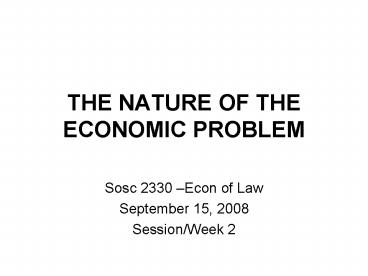THE NATURE OF THE ECONOMIC PROBLEM - PowerPoint PPT Presentation
1 / 22
Title:
THE NATURE OF THE ECONOMIC PROBLEM
Description:
ECON IDEAS OF RATIONAL BEHAVIOR' & EXCHANGE' OFFER AN IMPORTANT FIRST ... cost of foregone alternatives (alternative marginal utility/benefits foregone) ... – PowerPoint PPT presentation
Number of Views:58
Avg rating:3.0/5.0
Title: THE NATURE OF THE ECONOMIC PROBLEM
1
THE NATURE OF THE ECONOMIC PROBLEM
- Sosc 2330 Econ of Law
- September 15, 2008
- Session/Week 2
2
INTRODUCTION
- I like to meet youI paid 200 for getting your
name - Economic behaviour, return for investment?
- Should the law prohibit this practice?
3
ECON IDEAS OF RATIONAL BEHAVIOR EXCHANGE
OFFER AN IMPORTANT FIRST RATIONALE FOR LAW
EXCHANGE RATIONAL BEHAVIOR
LAW
4
OBJECTIVES
- Understand and assess the economic conditions and
economic rationality that determine the economic
environment of law - Scarcity
- Market exchange
- Rational Behaviour
- Understand how the law may relate to the economic
conditions and economic rationality - Law reflects and regulates economic conditions
and rational behavior - Case Study Food examples. Steel and Morris
v.McDonalds
5
ECONOMIC PROBLEM
- Scarcity
- Limited resources constraint choices
- Market exchange
- Supply and demand, price mechanism
- Rational Behavior (economists view)
- Self-interest
- Maximize benefits
6
RATIONAL BEHAVIOR
- Incremental Substitution subjective, imperfect,
less of one for more of other) - Cost given economy as rationing inadequate
supplies and incremental substitution) - Price transmits changing values associated with
substitution - Physical fallacy relocation of things in time
and space affects value (e.g. middleman has
knowledge, stores and re-sells at higher price) - Marginal utility additional satisfaction/benefit/
profit for additional unit, preference subjective
7
RATIONAL BEHAVIOR
- Opportunity cost use of limited resources incurs
cost of foregone alternatives (alternative
marginal utility/benefits foregone) - Diminishing Returns beyond some point, more
inputs result in disadvantage e.g. the more you
consume, the less satisfaction - Marginalism focus on proportion e.g. health
services but also recreation (marginal utility
instead of total utility, how much of each option
depending on required benefits of each)
8
SOCIAL WELFARE happy consumers, jobs
CONSUMER Hungry? Income? Price? Or try
pizza? How many?
PROVIDER Demand? Costly supply? Profit? Or try
clothing industry? How much supply?
INVESTORS Stock price? Return? Long-term
profitability? Or try Vodafone? How much in
McDonalds?
9
What problems may arise from an economy driven by
solely self-interest/econ. behaviour?
10
(No Transcript)
11
SCARCITY, MARKET EXCHANGE AND SOCIAL WELFARE
WITHOUT LAW
DECREASE IN SOCIAL WELFARE INEFFICIENT OUTCOME
NO TRADE OR UNFAIR TRADE
PRISONERS DILEMMA eg. Defective car
CONSUMER
CORPORATION
RATIONAL BEHAVIOR Substitution Marginal
Utility Diminishing Return Proportion Opportunity
Cost Supply/Demand Prices Self-Interest
12
RATIONAL BEHAVIOR POLICY
- Self-interest alone leads to inefficient social
outcomes Prisoners dilemma (if you buy and not
pay, you sell but not deliver, trade is not
possible and no job and wealth creation,
free-riding, self-interest is collectively
self-defeating assuming no law and external
control) - Self-Interest requires Legal and Moral
Constraints to achieve social welfare - Trade-offs cost and benefit analysis is basis
for policy including legal intervention to
maximize social welfare however defined-
(Winter)
13
LAWs ROLE RATIONAL BEHAVIOR
- Law often assumes rational behaviour on the
part of consumers and corporations. - Law thus facilitates the development of
welfare-enhancing rational behaviour - However, law also penalizes welfare-lessening
rational behaviour.
14
EXAMPLE
- Food Drug Act
- allow consumers make rational consumption
decision by e.g. imposing on corporations the
duty to disclose information. It also prohibits
misleading advertising and commercialization of
unsafe food
15
PROBLEMATIZING THE RELATION BETWEEN RATIONAL
BEHAVIOR AND LAW
- Does the economic idea of rational behaviour
account for all kinds of market behaviour?
16
Steel and Morris v.McDonalds (1990-2005)
- McDollars, McGreedy, McCancer, McMurder,
McDisease ... - Lack of government aid to consumers to prove the
accuracy of their criticism against a corporation
is a violation of their freedom of expression
17
Steel and Morris v.McDonalds (1990-2005)
- http//www.youtube.com/watch?vLyGK5j_EcmE
- http//www.youtube.com/watch?voqnNpEzYJ-Qfeature
related
18
Does the behavior of Steel and Morris conform to
rational behavior?
- Incremental Substitution? Marginal Utility?
Self-interest?
19
Some Problems with Marginal Utility and
Cost-Benefit Analysis
- Marginal utility collides with ethical commitment
- MU is subjective and varies across individuals
and societies - MU depends on e.g. existing income and wealth
distribution e.g. if poor, MU does not apply or
differs as opposed to rich - Law also responds to such concerns
20
Steel and Morris v.McDonalds THE COURTs
DECISION
- Legal Protection of Corporate Image
- anti-defamation rights,
- Law conforms with nature of economy and rational
behavior (e.g. law is responsive to marginal
utility, problems of prisoners dilemma and need
to increase social welfare) - Legal Protection of Free Expression and Democracy
- However, the law does not fully conform with
economic rationality and takes into account other
non-economic values e.g. consumers freedom of
expression
21
PROBLEMS re SCARCITY, MARKET EXCHANGE AND SOCIAL
WELFARE WITH LAW
INCREASE IN SOCIAL WELFARE EFFICIENT OUTCOME
FAIR TRADE
LAW
PRISONERS DILEMMA eg. Defective car
CONSUMER
CORPORATION
RATIONAL BEHAVIOR Substitution Marginal
Utility Diminishing Return Proportion Opportunity
Cost Supply/Demand Prices Self-Interest
Ability to Pay Wealth Distribution Irrational
Calculation Cognition Production Cost Ethical
Commitment
LAW
22
CONCLUSION
- Scarcity, Market Exchange and Rational Behavior
characterize the modern economy. This in turn
offers a rationale for laws role - The law is responsive to the nature of the
economic problem, but it also pursues other
non-economic values - Next further on the economy market failures
also provide rationale for laws role































